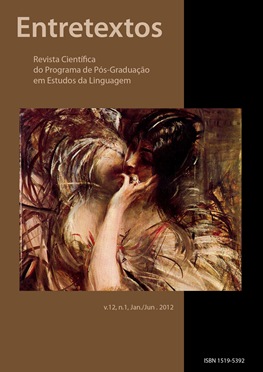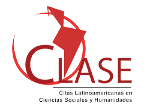The use of rhetorical reformulations and hesitation for achieving the audience's acceptance in Reality shows
DOI:
https://doi.org/10.5433/1519-5392.2012v12n1p149Keywords:
Rhetorical Reformulation, Repetition, Hesitation, Face-Work, Spoken EnglishAbstract
This article deals with the hesitation, repetition and rhetorical formulations used by the competitors of a reality show program in order to have their positive faces preserved and, consequently, to get the audience's agreement and acceptance. The corpus of this study is composed of the recording of the episode entitled "Reunited" from the second season of the reality show "Ru Paul's Drag Race" aired by VHI, a cable television channel, on Thursdays at 09:00 PM. We highlight that the corpus can be classified as a spontaneous conversation as it presents the basic characteristics of the spoken text, such as: low level of verbal planning, involvement of partners with each other and with the subject, and the existence of a shared space among interactants. In such case, the descriptions of linguistic materiality and the qualitative interpretations based on concepts of Conversation Analysis are used. Finally, the results obtained from the analysis of rhetorical formulations are presented, particularly concerning repetition and hesitation, emphasizing the intentional use of these resources by speakers whose aim is to build a positive image and increase their popularity among the viewers of the program.Downloads
References
BROWN, Gillian; YULE, George. Discourse analysis. Cambridge: Cambridge University Press. 1983.
CASTILHO, Ataliba T. Problemas de descrição da língua falada. Revista D.E.L.T.A, v.10, n.1, p.47-71, 1994.
CASTILHO, Ataliba T. A língua falada no ensino de português. 5.ed. Contexto, 2003.
ANDRADE, Maria Lúcia da Cunha Victório de Oliveira; AQUINO, Zilda Gaspar Oliveira de. Oralidade e escrita: perspectivas para o ensino de língua materna. São Paulo: Cortez, 1999.
GALEMBECK, Paulo de Tarso. O turno conversacional. In: PRETI, Dino (Org.). Análise de textos orais. 6.ed. São Paulo: Humanitas/ Publicações FFLCH/USP, 2003, p.55-79.
GALEMBECK, Paulo de Tarso. Metodologia de pesquisa em português falado. In: RODRIGUES, Ângela Cecília de Souza et al. (Orgs.). I Seminário de Filologia e Língua Portuguesa. São Paulo: Humanitas/ FFLCH/ USP, 1999, p.109-119.
GALEMBECK, Paulo de Tarso; CARVALHO, Kelly Alessandra. Os Marcadores Conversacionais na Fala Culta de São Paulo (Projeto NURC/SP). Revista Intercâmbio, São Paulo, v.6, p.830-850, 1997
GOFFMAN, Erving. Les rites d'interaction. Paris: Les Éditions de Minuit, 1974.
HILGERT, José. G. Procedimentos de reformulação: a paráfrase. In: PRETI, Dino (Org.). Análise de textos orais. 6.ed. São Paulo: Humanitas/ FFLCH/USP, 2003. p.103-127.
KOCH, Ingedore G. Vilhaça. O texto e a construção dos sentidos. 9.ed. São Paulo: Contexto, 2007.
MARCUSCHI, Luiz. A. Marcadores conversacionais do português brasileiro: formas, posições e funções: In: Castilho, Ataliba T. de (Org.). Português Falado no Brasil. Campinas/SP, 1989.
MARCUSCHI, Luiz. A. Repetição. In: KOCH, Ingedore Villaça; JUBRAN, Clélia Cândida Abreu Spinardi (Orgs.). Gramática do português culto falado no Brasil. Campinas/SP: Ed. Unicamp, 2006, (Construção do texto falado, v. 1).
MARCUSCHI, Luiz. A. Análise da conversação. 5.ed. São Paulo: Ática, 2003.
OLIVEIRA, Jair A. Polidez a virtude do simulacro. IUniletras, Ponta Grossa, n. 21, n. 21, dez, 1999.
PRETI, Dino (Org.). Análise de textos orais. 6.ed. São Paulo: Humanitas/ FFLCH/USP, 2003.
RAMOS, Jânia. Hipóteses para uma taxonomia das repetições de estilo falado. Dissertação (Mestrado) - Universidade Federal de Minas Gerais. Belo Horizonte: s.c.p.,1984.
RISSO, Mercedes. S. A dimensão interacional na construção do texto falado: os marcadores. In: Letras & Letras, Uberlândia , v. 11, n. 1, p.215-225, jan./jun. 1995.
RODRIGUES, Ângela C. S. Língua Falada e escrita. In: PRETI, Dino (Org.). Análise de textos orais. 6.ed. São Paulo: Humanitas/ FFLCH/USP, 2003, p.15- 37.
SILVA, Luiz, A. Polidez na interação professor/aluno. In: PRETI, Dino (Org.). Estudos de Língua Falada: variações e confrontos. São Paulo: Humanitas/FFLCH/USP, 1998.
Downloads
Published
How to Cite
Issue
Section
License
Copyright (c) 2012 Entretextos

This work is licensed under a Creative Commons Attribution 4.0 International License.
Entretextos adota a Licença Creative Commons Attribution 4.0 International, portanto, os direitos autorais relativos aos artigos publicados são do/s autor/es.
Sob essa licença é possível: Compartilhar - copiar e redistribuir o material em qualquer suporte ou formato. Adaptar - remixar, transformar, e criar a partir do material, atribuindo o devido crédito e prover um link para a licença e indicar se mudanças foram feitas.
























